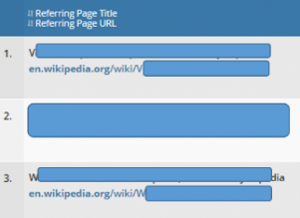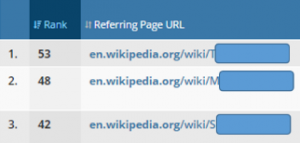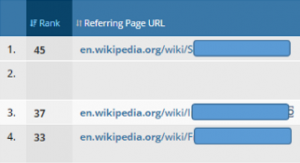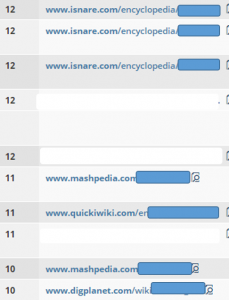If you’ve been building sites for a while you’ll know that you go through peaks and troughs of motivation and excitement around what you’re doing.
For the last 2 months I’ve been on one of the biggest stretches of massive motivation that I can remember. I’ve literally not had a day with zero IM time in the past two months.
I’ve been on an Authority site building bender and testing like a mad man. We’re always testing and experimenting with something around here, but when I say I’ve been testing, I mean I’ve been TESTING.
In fact, 75% of each of our last two Internship intakes have been dedicated to either learning new tactics from scratch (such as harnessing the power of Reddit) or making our existing strategies better.
One SEO tactic we’ve been teaching our SEO Internship and training course participants for a bit over 12 months is how to get links from Wikipedia.
This is not a brand new tactic and there are lots of ways to do it. I believe the first I heard of it was via this article from Backlinko.com. A few weeks after we were teaching our methodology to our course participants, Doug Cunnington popped up with a guest post on MatthewWoodward.com. Jon Cooper has written about it also, so it’s certainly a tactic that is “out there”.
I won’t bother with providing an overview of how to get the links, as the posts from Backlinko.com and MatthewWoodward.com do a fantastic job of that > ^check them out if you’ve not tried this tactic before.
This post will build on the “how to” information readily available on those two sites and give you a comprehensive overview of how to get links from Wikipedia in 2015.
Are The Links Valuable?
The links are No Follow, but I don’t pay any attention to no follow vs do follow. The fact is, you need a mix of both in your link profile.
You don’t need too much common sense to work out that a link from one of the biggest sites on the web (Alexa ranking is 7), one that ranks for most keywords you search and one that is tightly moderated for accuracy, is going to be very valuable. Job Cooper points out the same and also references it as being a useful traffic source.
For example, one of my clients has a link in one of Wikipedia’s articles that is in a very insignificant place on the page (below the content and all of the other references), yet that one link provides 50 visitors a week for a small niche website. The value isn’t in question, it’s how you can get your links on the page.
Although I’ve not noticed any significant traffic from Wikipedia to dozens of sites that have links, it’s certainly a handy potential side-benefit.
We found another potential benefit to having Wikipedia links, though it’s far from conclusive evidence, when the PBN Update rolled through in September and tons of sites got crushed with Thin Content penalties.
We found that a handful of sites with almost identical PBN-use to others that got hit, but WITH wikipedia links escaped the “Thinny”. So the only difference between A group that got hit with Thin Content penalties and Group B that didn’t, was the presence of Wikipedia links. I don’t believe links from Wikipedia alone prevent penalties (there would be other factors at play) and it’s a small group of 4-5 sites, but it was an interesting observation none-the-less.
Does the Tactic Still Work?
Yes.
The post on MatthewWoodward.com was made when Matthew’s blog was really starting to pick up serious momentum and we thought the tactic would have diminishing returns due to popularity, over-use and Wikipedia getting smarter with detecting it.
In our experience in using the technique in 2014, by late 2014 we were noticing that it definitely still worked, but the chances of a link being removed by Wikipedia moderators had increased.
SEO is an ever-evolving game, which is why we’re investing so much effort into working outside from Google as much as with it…. But it was time to run a Wikipedia links test at reasonable scale and that we did!
How To Get Links From Wikipedia in 2015
Over a 2 week period in late December we edited 15 Wikipedia pages with links to 7 of our money sites. We have far more testing to do, but we have gained some very clear insights from the initial set of 15 links placed.
We were looking to identify the following information:
- Can you still get links to stick to “standard” Amazon affiliate sites?
- Can you get links to stick to fairly new sites?
- Does the look/feel of the site impact on the likelihood of a link sticking?
- Are there certain niches that perform better?
Some Ground Rules
- Don’t go crazy with this. Apparently your site can get added to a spam blacklist. You don’t want that. Placing a link or two to a money site will be fine.
- We always remove any monetization from the pages/posts we create prior to making the edit and placing the link.
- As referenced in the posts I linked to above, you’ve got to put time into this. I suggest having a wiki editor account that is at least a few weeks old before you place the money site links. Make genuine edits to other Wikipedia pages spaced out over a period of time also.
- Place links form different IPs. Place the odd one from a cafe, some from your home etc. The rationale here is that editors might be able to pick up edits by looking at the IP used.
Profile of Sites Used
- 4 typical Amazon affiliate sites.
- Site #1 (home & garden niche), #2 & #3 (both sport & recreation niche)
- Each targeting a specific “best {product}” and “{Product} reviews” keywords (standard Amazon sites).
- Each using fairly standard themes (eg WooThemes templates).
- “Neat” looking sites, but pretty much just out-the-box template with a custom header image. Site #1 and #2 only had 6 and 8 main pages of content.
- Site #3 had far more content (62 indeed pages in Google).
- Each were set to show a single page or post on the home page
- Content all review articles.
- Site #4 (beauty niche)
- Has a bit more customization. It looks cleaner, more visually appealing at first glance.
- Also set to show a single page/post on the home page, but the customization made the page look like it contained a heap more content (blocks of text as opposed to free flowing text of a standard page). It’s Thrive Content Builder-like in it’s appearance.
- Content all review articles.
- Site #1 (home & garden niche), #2 & #3 (both sport & recreation niche)
- 1 x new site, Site #5 (Targeting Google AU finance niche)
- Also was using an out-the-box WooTheme template. Nothing too fancy about it form a look/feel perspective.
- Set to display latest 10 posts on the home page (full-text) and a recent posts list in the right upper sidebar. I note this because it gives the appeal of a fairly “full site” even though it only had 15 pages of content at the time of placing the links.
- Content largely loans, insurance and finance articles.
- 1 x established site (6 months old), Site #6 (site a bit like www.artofmanliness.com)
- Magazine theme layout by MyThemeShop
- Approx 20 posts displayed on the home page
- 40 indexed pages all up
- Varied content ranging from advice articles to clear SEO style articles (review articles)
- 1 established site (4 months old), Site #7 (health niche, site a bit like www.HealthAmbition.com)
- Magazine theme layout by Thrive themes
- Approx 30 posts displayed on the home page
- 40 indexed pages all up
- Varied content ranging from advice articles to clear SEO style articles (review articles)
Results
- Sites #1, #2 and #3 had one link placed to each. All 3 links were reverted within 24 hours. (0% success rate)
- Site #4 (the better looking Amazon affiliate site) had two links placed. 1 stuck. (50% success rate)
- Site #5 (the new Australian finance site) had 4 links placed. 2 stuck. (50% success rate)
- Site #6 (ArtOfManliness-like site) had 4 links placed. 3 stuck. (75% success rate)
- Site #7 (Health magazine style site) had 3 links placed. 2 stuck (67% success rate)
All up, 8 links stuck from 15 attempts.
Overall Success Rates Per Site Type
- Amazon sites had a low 25% success rate
- Amazon sites using out-the-box templates with zero customization had a 0% success rate
- Magazine style sites had a 71% success rate
Key takeaways:
- Wiki moderators are human. A nice looking site goes a long way to helping a link to stick!
- The more resourceful your site looks, the more likely the links will stick (a home page with plenty of featured posts helps to give the perception of a “full” site)
More Analysis
That’s all nice statistical data above, but let’s dig a little deeper.
1. I noticed a very clear evidence that any links placed on very “mainstream” wiki pages that would have high search volume main keywords were rejected. As an example of what I mean (we did not place links on these pages, they’re examples only), pages like:
- http://en.wikipedia.org/wiki/Vehicle_insurance
- http://en.wikipedia.org/wiki/Car_finance
- http://en.wikipedia.org/wiki/Elliptical_trainer
- ^ Each of the above pages are about fairly high search volume keywords.
2. We had significantly better success when links were placed on random topics such as;
- Weird foods
- Brands (2 from 2 links stuck on brand pages)
- Celebratory days that you would probably not even know of!
- ^ Wish I could reveal more, hopefully you get the idea!
3. I was hoping to be able to use a simple metric such as Page Authority (Moz metric) as an indicator, but found nothing to hang my hat on. Here’s what the PA of the pages were:
- PA of pages where links were removed: 53, 91, 64, 83, 73, 58, 76
- PA of pages where links stuck: 47, 82, 67, 62, 87, 64, 72, 77
- ^ No correlation between PA and links sticking/being removed unfortunately so I can’t give you set criteria to work on other than to advise that looking for dead links on pages where fewer people would be looking certainly achieved a better result. My theory is that they are potentially less frequently moderated or that certain pages are looked at more closely (Wikipedia is a big beast of a site, it’d be very hard for them to moderate everything efficiently. I presume the apply the 80/20 rule to moderation).
4. If you have placed multiple links from a single editor account, when one of your links gets found and reverted, the moderators will usually go back through your other edits and revert money site links also. I’ve had an instance before of all links to my money sites being removed, but links placed to an SEO client’s site stayed in place (this was a genuine edit), so the Wiki moderators are not stupid and can tell a genuine edit from an attempt to score a link to a money site.
If you want to avoid having to create new editor accounts and having to go through the process of making genuine edits repeatedly for each new account, a potential way to safeguard yourself is to make plenty of genuine edits before and after each money site link you place. I haven’t tested this, but it makes sense.
The only other alternative is to setup one wikipedia account per money site and not getting greedy with placing links > once you get one to stick, don’t add any more!
5. It’s fine to have multiple links to a single money site from wikipedia, but place them all from different wikipedia accounts so that you don’t risk what I outlined above.
6. Aim to improve the resource you create beyond what was provided on the original resource that is now the dead link. We found a few instances where we just pretty much recycled the old content through finding it on archive.org and when the Wiki editor reverted our change, they just linked to the archive.org page!
A Little More Detail
After placing your Wikipedia link, you can do some broken link building (as outlined in Backlinko’s and Matthew’s posts above). We have tested this and jagged some nice niche-relevant links, but I haven’t yet gathered sufficient data to make a judgement on the ROI in terms of time invested vs links earned. Here’s what I have noticed though:
1. Analyzing the sites linking into the dead link URL you replaced can identify some very low hanging fruit for link acquisition. You’ll find some easy links to get on pages like;
- Answers sites: https://answers.yahoo.com/. Just go in and make a suggestion with your link included.
- Blog articles: Either ask the webmaster to replace the link or place the new link in the comments section.
- Forums: Just go in, make a couple forum comments on other articles and then a week later you can add a link to your money site in the forum thread of the dead link.
2. You will find many sites scrape Wikipedia pages for content. When they do this, they pick up your link as well. Not the best quality links in the world, but links that were gathered without any additional effort on your part. Here’s an example:
Summing Up:
So there you go, you can still snag links from Wikipedia if you are willing to put in a little extra effort. If you have a tactic or additional tips on how to get the links, feel free to pop a comment below!




Steve says:
Great stuff Grego, you gotta keep all these tactics quiet, else they’ll become saturated!
Definitely helps to go to the lesser traveled pages in Wikipedia, and adding some value to the page helps grease the wheels a little (i.e.so they can see you’ve put genuine effort in) rather than just dropping a link!
Chris from CONVERSEO says:
Hi Greg, thanks for this nice piece of tips. I’ve used this tactic in my very first years of SEO and actually I don’t know why I stopped. This will be a good starting point to reuse it.
Additionally I have found very small misspelling in the “Profile of Sites Used” section you can find “Site #3 had far more content (62 indeed pages in Google).” and it suppouse to be 62 indexed pages.
Cheers!!
Chris
GregNunan says:
Thanks Chris!
Nelson Schuck says:
I link in wikipedia to more than three years, one of the things I always take into account is the page quality in question. During the link bait process through infographics take advantage and place a link to this page with embede the infographic on wikipedia, this link to add user and end up passing through the manual review of links. In addition to following the other strategies mentioned above as a single IP and etc.
Nice article, and excuse my English.
GregNunan says:
Thanks Nelson!
Lee says:
Awesome post, thanks so much Chris! It help for my backlink strategy.
Jesse says:
Solid stuff Greg.
I gave Matthew’s content a read a few months ago and instantly the “lights went on upstairs”.
Excellent case study paying attention to the impact of site quality, content, changing up where you place links, making other positive contributions to Wikipedia. The more people talk about this the better it gets. In almost an eloquent way it will keep spamming to a minimum and raise the bar for quality thanks to human moderation. **Cough never gonna happen with GSA links***
Just one more solid way to create meaningful content and drive some pretty stellar traffic.